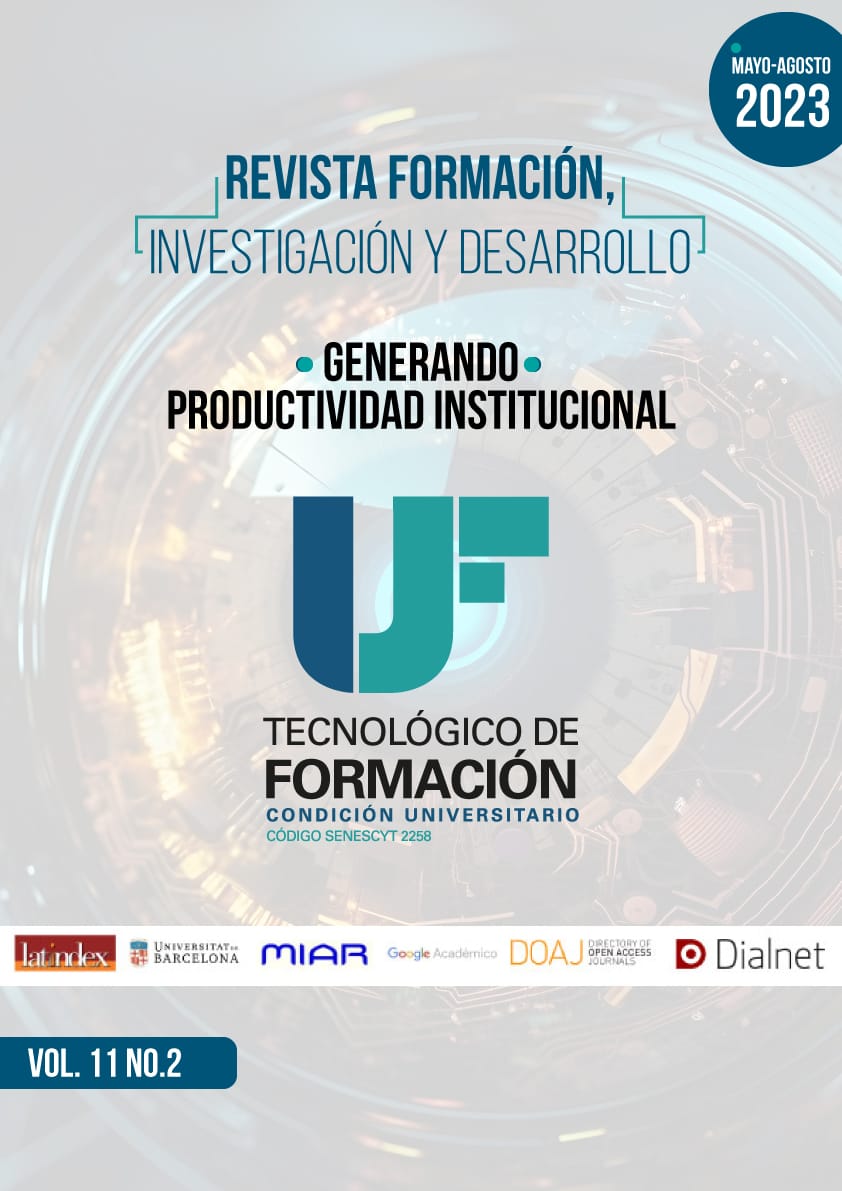Effective application of the TPACK Model in Pedagogical Strategies
Main Article Content
Abstract
The educational system at present is in constant changes in the design of pedagogical strategies that
allow to manage an efficient learning of the students and their integration with the technologies. This
has led to the restructuring of pedagogical models and strategies that seek to coherently integrate new
technological trends as a support tool for teaching. For this, the TPACK Model (Technology, Pedagogy
and Knowledge Content) offers the teacher the possibility of designing activities and learning styles
enhanced by technology. This article analyzes the pedagogical strategies and their relationship with the
TPACK Model, which will allow the formation of new abilities, skills in students and teachers, in addition
to creating creative and innovative tools that make it possible to achieve increasingly significant
learning.
Article Details

This work is licensed under a Creative Commons Attribution-NonCommercial-ShareAlike 4.0 International License.
Este trabajo tiene licencia DE Atribución/Reconocimiento-NoComercial-CompartirIgual 4.0 Internacional. CC BY-NC-SA 4.0.
How to Cite
References
Acevedo, J. (2014). Introducción al mobile Learning: enfoque tecnológico. Revista de Universidad y Sociedad del Conocimiento, RUSC, 1(2), 1-10.
Anderson, A. (2013). Using the TPACK framework to unite disciplines in online learning. Australasian Journal of Educational Technology, 29(4), 548-565.
Angeli, C., Valanides, N. (2009). Epistemological and methodological issues for the conceptualization, development, and assessment of ICT-TPCK: Advances in technological pedagogical content knowledge (TPCK). Computers & Education, 52(1), 154-168.
Antunes, P. y André, P. (2006) Conceptual Framework for the Design of GeoCollaborative Systems Group Decision and Negotiation, 15, 273–295.
Bonil, J., Márquez, C. (2009). ¿Qué experiencias manifiestan los futuros maestros sobre las clases de ciencias? Implicaciones para su formación. Revista de Educación, 354, 447-472. Recuperado de https://ddd.uab.cat/pub/artpub/2011/167509/reveduMECD_a2011m1-
4v354p447.pdf
Brown, J. (2010). Mobile Learning ¿el futuro del aprendizaje? Recuperado de http://www.learningreview.com/e-learning/articulos-y-entrevistas/1609-mobile-learning-ielfuturo-del-aprendizaje
Castells, M. (2002) La dimensión cultural de Internet. Disponible en: http://www.uoc.edu/culturaxxi/esp/articles/castells0502/castells0502.html.
Cárdenas, A. (2014). El aprendizaje móvil en la educación superior M – Learning. República Bolivariana de Venezuela. Ministerio del Poder Popular para la Educación Superior. Universidad Nacional Experimental Politécnica de la Fuerza Armada Bolivariana. San Cristóbal.
Chang, C.Y.; Sheu, J.P. y Chan, T.W. (2003). Concept and design of ad hoc and mobile classrooms. Journal of Computer Assisted Learning, 19(3), 336-346
Chen, C., y Hsu, S. (2008). Sistema de Aprendizaje móvil inteligente personalizada de Apoyo Efectivo Inglés Aprendizaje. Educación, tecnología y sociedad, 11 (3), 153-180.
Gutiérrez, A., Palacios, A., & Torrego, L. (2010). La formación de los futuros maestros y la integración de las TIC en la educación: anatomía de un desencuentro. Revista de Educación, 353, 267-293.
Gramajo, J. (2014). M-LEARNING Metodología para desarrollo de Aplicaciones Educativas Moviles. Revista de investigación sobre tecnología en la educación, 42, pág. 123-149.
Gros, B. (2004). Estudio sobre el uso de los foros virtuales para favorecer las actividades colaborativas en la enseñanza superior. Revista Teórica de la Educación: Educación y Cultura en la Sociedad de la Información, 5.
Harris, J., & Hofer, M. (2009). Instructional planning activity types as vehicles for curriculumbased TPACK development. In C. D. Maddux (pp. 99-108). Estados Unidos de América: SITE.
Haydn, T. (2010). Case studies of the ways in which initial tracher training providers in England prepare student to use ICT effectively in their subject teaching. Jung, I. (2005). ICT-Pedagogy integration in teacher training: application cases worldwide. Educational Technology & Society, 8(2), 94-101.
Koehler, M., Mishra, P., y Cain, W. (2013). What Is Technological Pedagogical Content Knowledge (TPACK)? Journal of Education, 193(3), 13–19.
Meso, K., Pérez, J., & Mendiguren, T. (2009). La incorporación de las TIC al ámbito educativo en las aulas de la UPV-EHU. Presentación del caso desde la Facultad de Ciencias Sociales y de la Comunicación 1. Libro Nuevos Medios, 1–8.
Montaner-Villalba, S. (2017). Santiago, R. et al. (2015) Mobile Learning. Nuevas Realidades en el aula. (Innovación Educativa) Digital-Text, Grupo Océano, 354 pp. RIED. Revista Iberoamericana De Educación a Distancia, 20(2), 341–342.
Rodríguez, J., y Coba, J. (2017). Impacto del m-learning en el proceso de aprendizaje: habilidades y conocimiento. RIDE Revista Iberoamericana para la Investigación y el Desarrollo Educativo, 8, p. 15.
Sánchez-Prieto, J. C., Olmos-Migueláñez, S., y García-Peñalvo, F. J. (2017b). Motivación e Innovación: Adopción de Tecnologías Móviles en los Maestros en Formación. RIED. Revista Iberoamericana de Educación a Distancia, 20(2)
Sánchez, J. (2003). Integración curricular de las TIC: conceptos e ideas. Revista Enfoques Educacionales, 5(1), 51-65.
Schmidt, D., Baran, E., Thompson, AD, Mishra, P., Koehler, M. & Shin, TS (2009). Conocimiento del contenido pedagógico tecnológico (TPACK) el desarrollo y la validación de un instrumento de evaluación para profesores en formación. Revista de investigación sobre tecnología en la educación, 42, pág. 123-149
Salinas, J. (2014). Competencias docentes para los nuevos escenarios de aprendizaje. Revista Interuniversitaria de Formación del Profesorado, 79, p. 145-163.

